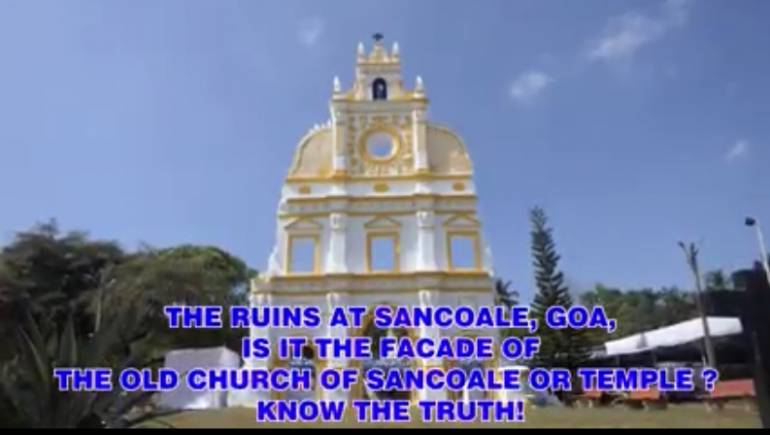Right-wing extremists threaten to disrupt Catholic Feast in Goa on January 16. Priests appeal for communal harmony

The coastal Indian state of Goa is tense over a viral video of a right-wing outfit threatening to stop the feast of Saint Joseph Vaz from being held on January 16. However, local Catholic priests appealed for peace and harmony, clarifying the alleged claims of the fringe elements are baseless.
Tension prevailed in village of Sancoale after a video went viral wherein a right-wing outfit member was seen forcing Goa’s Archives and Archaeology employee to stop the Novenas and Feast of St Joseph Vaz, which take place at the Frontispiece of Sancoale Church, where Saint Joseph Vaz once worshipped.
Joseph Vaz was an Oratorian priest and missionary in Sri Lanka, born and brought up in Portuguese Goa and Bombay in India. Pope Francis canonized Joseph Vaz on January 14, 2015, at Galle Face Green, Colombo, in Sri Lanka.
The Right-wing groups warn of consequences if the venue of the novenas and feast of St Joseph Vaz is not shifted from what they claim is a protected archaeological site. Over a week ago, the priests had lodged a complaint of harassment and assault by right-wing groups on parishioners preparing for the feasts.
Father Kenneth Teles, Sancoale Parish Priest and Father Manuel Dias, the Rector of Saint Joseph Vaz Sanctuary, appealed for peace and harmony.
The announcement was made via the YouTube channel of Diocesan Centre for Social Communication Media Goa on January 12.
Similar announcements are made during the Saint Joseph Vaz novena masses stating the church was built in 1606, and since that time, the property belonged to the church.
“There is no evidence of the existence of any other religious structure at the old Sancoale church and seven properties around the church belong to the Fabrica of Sancoale Church,” Father Teles noted.
The priests informed the congregation that the church existed for around 200 years and was the parish church of the people of Sancoale.
Both priests claim some persons with the intention to grab the property have filed a case against the church. Since the case has no grounds, the fringe elements have resorted to creating division and communal disharmony among two religious communities in Goa.
“Saint Joseph Vaz grew up and was a parishioner of that church and even wrote his famous Letter of Bondage to Mary, Our Lady of Good Health, in that Church,” Father Teles said.
A fire later destroyed the church, except the altar and the façade and sometime later, there was a chapel built around the altar, the priest said.
Father Teles requested the support of the people to convey the truth about Sancoale to others. The priest invited people for a Charismatic Healing Service every Sunday beginning January 23.
Meanwhile, the Chief Electoral Office (CEO) has directed the South Goa Collector/District Electoral Officer (DEO) to take necessary action and report the compliance in the matter.
In a letter to the South Goa Collector/DEO, Deputy Chief Electoral Officer Sangeeta Naik said the CEO received a letter from the Catholic Association of Goa(CAG) President Emidio Pinho seeking stringent action against fundamentalist groups/elements trying to sow discord and disharmony among religious communities in Sancoale.
Earlier, Churchill Alemao, Goa’s Trinamool Congress (TMC) leader, had demanded the immediate arrest of Bajrang Dal leader Jayesh Naik for disturbing Hindu-Christian religious harmony at Sancoale by creating issues with regards to the Saint Joseph Vaz feast on January 8.
“Hindutva agenda is not acceptable in States such as Goa, and in the country where all believe in harmony and peace,” Alemao said to media persons at his Varca Office.
Alemao urged Pramod Sawant, Goa’s Chief Minister, to intervene in the matter.
"We are all peace-loving people and Goans live in harmony, and hence nobody should be allowed to disturb it," he said.
Radio Veritas Asia (RVA), a media platform of the Catholic Church, aims to share Christ. RVA started in 1969 as a continental Catholic radio station to serve Asian countries in their respective local language, thus earning the tag “the Voice of Asian Christianity.” Responding to the emerging context, RVA embraced media platforms to connect with the global Asian audience via its 21 language websites and various social media platforms.














